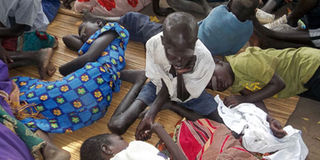Government must tackle nodding syndrome once and for all

Children affected by nodding syndrome suffer severe malnutrition and disability in addition to experiencing regular seizures and the characteristic nodding of the head. File photo
What you need to know:
- The issue: Nodding syndrome
- Our view: The government should be on top of its game when it comes to the health of its citizens.
In 2012, we learnt about the nodding syndrome, a mentally and physically disabling disease that affects children between five and 15 years old. Images of parents tying their children to trees as a means of controlling the nodding filled our papers and television screens. There was uproar as people asked the government to do something.
The most frustrating aspect about the disease was that no particular cause had been identified. Soon research teams from around the world were studying this disease, with Uganda as a case study.
It turned out that the disease dated as far back as the 1960s, and was first detected in Sudan. Now that it was in northern Uganda, a region that experienced insurgency for nearly 20 years, several theories were built around the disease being a result of exposure to war. Other studies showed that a specific worm species and the black fly was responsible. Whatever the cause, the syndrome got the attention of people in Uganda and the rest of the world.
Non-government organisations clamoured to assist the patients and their families. A team of Gulu University students came up with a nutrition plan for patients, which seemed to work more effectively than the medication the government and the World Health Organisation had recommended. By 2013, the nodding syndrome story was more hopeful than dire. Soon talk of the disease fizzled out and we moved on.
Cue July 2017, when we published the story, ‘Hope fades for nodding syndrome victims as NGO closes care centres’. The story mentioned that the only NGO, which was providing care for nodding disease patients, was closing its centres. Locals appealed for government intervention.
Earlier this month, we published another story about children with nodding disease in Omoro District dying after the last care centre had closed its doors due to shortage of funds. The district chairperson mentioned that they had requested for a Shs500m supplementary budget to cater for nodding disease patients but hadn’t received any feedback.
Now, nodding disease is back. Hopefully, long-lasting action will follow this discussion. The government should be on top of its game when it comes to the health of its citizens. In the eight months between when the management of the centres said they were going to close shop and when they actually did, for instance, provided an opportunity for government to step up. Otherwise, the government risks appearing like it only acts when cameras flash on its face.




